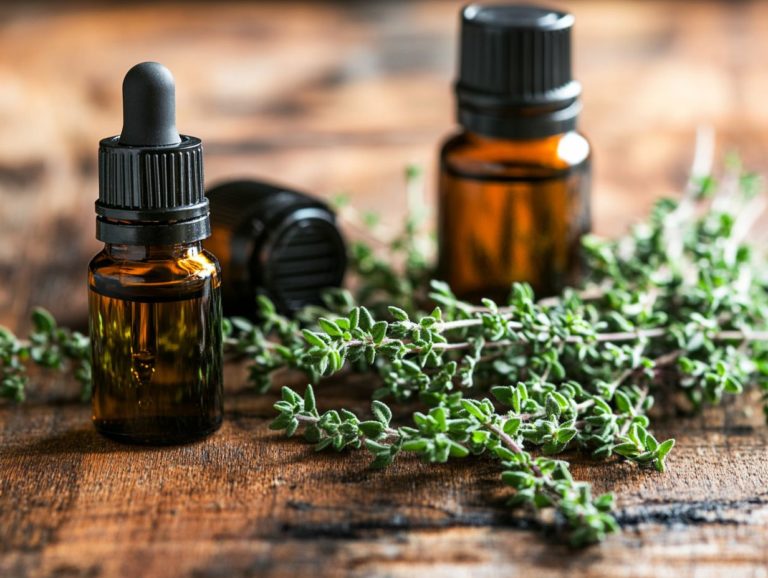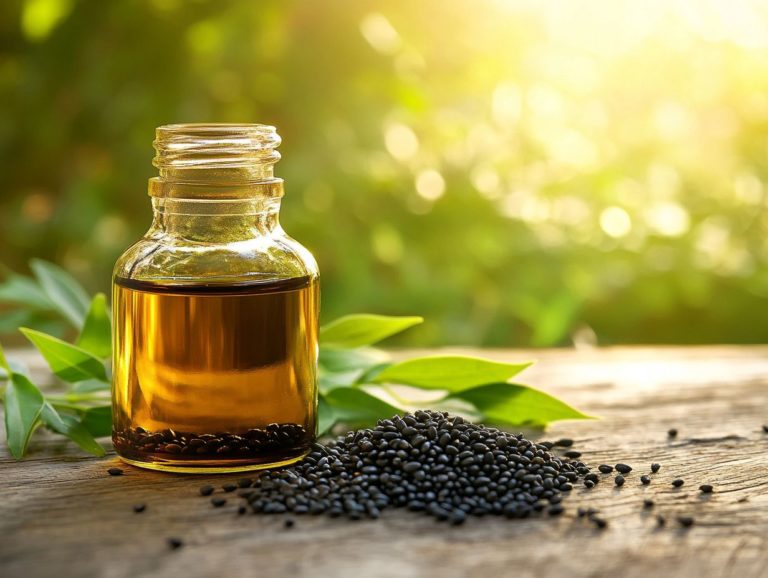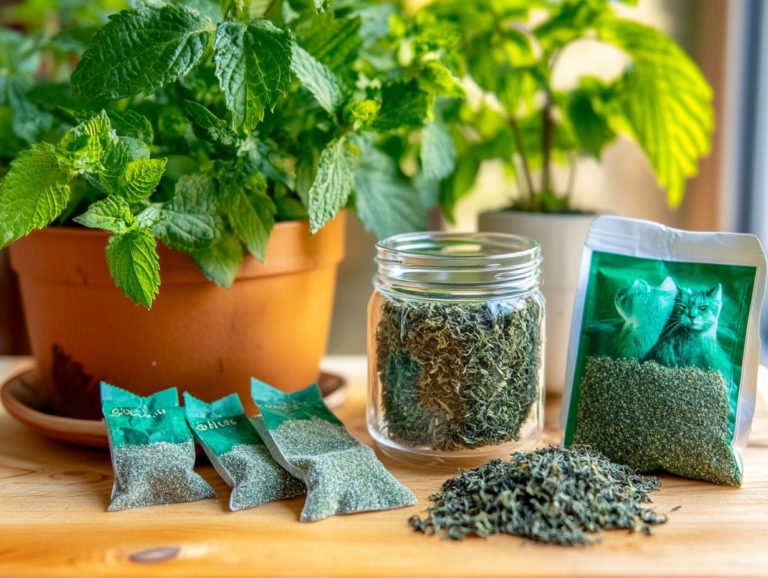The Role of St. John’s Wort in Mood Regulation
Mood regulation is vital to your overall well-being, affecting everything from your mental health to how you interact with others each day.
One natural remedy that has garnered significant attention for its potential benefits in mood regulation is St. John’s Wort. With a longstanding history in traditional medicine and growing scientific support for its effects, this herbal supplement could be exactly what you need, especially for individuals facing mild to moderate symptoms, including fatigue and anxiety.
This article delves into the essentials of mood regulation, the science behind St. John’s Wort, and offers practical tips for integrating it into your daily routine.
Explore how this remarkable herb can enhance your emotional balance and contribute to your overall health.
Contents
Key Takeaways:

- Mood regulation is the process of managing and stabilizing one’s emotions and behaviors.
- St. John’s Wort, a herb with a long history of traditional use, contains chemicals that may positively impact mood by affecting brain chemicals.
- Scientific research suggests that St. John’s Wort may have potential benefits in improving mood and overall mental well-being.
Understanding Mood Regulation
Mood regulation is an essential aspect of mental health, encompassing your capacity to effectively manage and respond to emotional states. It significantly influences how you navigate daily challenges and impacts your overall well-being.
Various factors biological, psychological, and social come into play when it comes to mood regulation. By understanding these dynamics, you can uncover more effective treatments and interventions, particularly if you re facing mild to moderate symptoms of depression or anxiety.
Herbal remedies like St. John’s Wort are gaining attention as a natural option to support mood regulation.
What is Mood Regulation?
Mood regulation encompasses the processes and strategies you employ to manage your emotional states effectively, significantly influencing your mental well-being.
This journey begins with a profound understanding of emotional awareness, which involves recognizing your feelings and understanding how they affect you. This awareness opens the door to various coping strategies like mindfulness techniques and changing how you think about situations, equipping you to navigate the emotional rollercoaster with increased resilience.
Serotonin levels play a crucial role in maintaining mood stability; changes in this brain chemical can affect how you feel. By nurturing a healthy balance of serotonin through mindful choices in diet, regular exercise, and fostering social connections, you can enhance your overall emotional regulation, leading to a more stable and positive outlook on life.
The Science Behind St. John’s Wort
St. John’s Wort, or Hypericum perforatum, has garnered considerable attention as a herbal remedy for mood disorders, specifically mild to moderate depression. Its active compounds are believed to engage with brain chemicals in the brain, presenting an intriguing alternative to traditional antidepressants, especially in the context of managing anxiety symptoms and maintaining optimal mental health.
Various research studies have delved into its effectiveness and safety, frequently contrasting it with placebo effects, while also pinpointing potential chemical interactions with other medications. By grasping the science behind this herbal solution, you can appreciate its increasing prominence in mental health treatment.
History and Traditional Uses
Historically, St. John’s Wort has served as an herbal remedy for centuries. It is prized for its medicinal qualities in addressing a range of emotional and physical ailments. Its roots trace back to ancient Greece, where it was known for its healing properties. People often used it to treat melancholia.
As time passed, various cultures embraced this adaptable herb, weaving it into their therapeutic practices. In medieval Europe, for instance, it was commonly used to fend off evil spirits and promote overall well-being. With the evolution of herbal medicine, the understanding of St. John’s Wort s active compounds, such as hypericin and hyperforin, has deepened. This has allowed its incorporation into modern holistic health approaches.
Today, many people still look to this age-old remedy. They resonate with traditional beliefs while also enjoying the benefits of contemporary research.
Chemical Composition and Mechanism of Action

The chemical composition of St. John’s Wort features several active ingredients that are vital for regulating mood.
Among these compounds, hypericin and hyperforin stand out. Hypericin is believed to interact with brain chemicals, while hyperforin may enhance the availability of serotonin in the brain. This increase in serotonin levels is essential because serotonin is widely recognized as a key factor in mood enhancement. Therefore, the combination of these compounds might assist in alleviating symptoms of mild to moderate depression.
Research indicates that the effective synergy of St. John’s Wort’s active ingredients contributes to its antidepressant properties. This presents a natural alternative for those looking to manage mood swings and improve emotional well-being.
Benefits of St. John’s Wort for Mood Regulation
St. John’s Wort is celebrated for its potential in mood regulation, especially for those struggling with mild depression and anxiety. Discover the amazing potential of St. John’s Wort in transforming your emotional well-being.
A wealth of research has delved into its effectiveness as an alternative therapy. Evidence-based benefits bolster its role in enhancing emotional well-being.
Many individuals are drawn to this herbal remedy. They seek natural relief from their symptoms while aiming to sidestep the side effects often linked with conventional antidepressants.
Evidence-Based Effects on Mood and Other Potential Benefits
The evidence-based effects of St. John’s Wort on mood have been thoroughly examined through numerous research studies and clinical trials. Many studies bolster its effectiveness in addressing mild depression.
Research reveals that this herbal remedy can rival traditional antidepressants for some individuals, particularly those grappling with less severe symptoms. While it may present a viable alternative for many, it is crucial to consider its interactions with other medications, as it can reduce the effectiveness of certain treatments.
Some individuals may experience substantial improvement, while others might find conventional therapies more beneficial.
Therefore, if you’re contemplating the use of St. John’s Wort, always talk to a healthcare professional before starting any new treatment. This ensures a tailored plan that best suits your unique needs.
In addition to regulating mood, St. John’s Wort may alleviate symptoms of fatigue and anxiety. Research suggests it can be effective in alleviating fatigue, especially for individuals facing stress or chronic conditions. One study revealed that participants who incorporated St. John’s Wort into their routines reported notable improvements in energy levels and a decrease in feelings of exhaustion.
Its calming properties also help ease anxiety, serving as a natural alternative to pharmaceutical solutions for some. Many users report relief from stress-related anxiety when they add this herb to their wellness regimen.
This multifaceted impact makes St. John’s Wort an intriguing option. It not only stabilizes mood but also addresses a broader spectrum of mental and physical challenges.
How to Incorporate St. John’s Wort into Your Routine
Incorporating St. John’s Wort into your routine requires a careful approach regarding dosage guidelines and precautions, especially when mixing it with other herbal supplements or medications.
Always consult a healthcare provider to ensure safe usage and avoid any potential adverse reactions. This is particularly important if you’re taking antidepressants or other heart medications. Prioritizing your health is key.
Recommended Dosage and Precautions

The recommended dosage for St. John’s Wort varies based on the specific form of the supplement and your individual health needs. It’s crucial to follow proper dosage guidelines.
If you’re using extracts, a typical recommendation is between 300 to 600 mg, taken two to three times a day. For teas or tinctures, the dosage may differ, so check product labels for accurate information.
Be aware of potential side effects, which may include:
- Gastrointestinal disturbances
- Fatigue
- Sensitivity to sunlight
Safety concerns exist regarding interactions with various medications, especially:
- Antidepressants
- Hormonal contraceptives
Consulting a healthcare provider before starting any new supplement is essential. This ensures you receive personalized advice tailored to your health profile.
Combining with Other Treatments
Combining St. John’s Wort with other treatments can enhance its effectiveness, but it’s important to be aware of potential chemical interactions, particularly with antidepressants and other medications.
This herbal supplement is known for its mood-enhancing qualities and may offer combined benefits. However, it also carries the risk of unwanted side effects, such as serotonin syndrome, a serious condition caused by excessive serotonin levels. Interactions with other herbs, like ginseng or valerian root, could change their safety and effectiveness.
Due to the complexities of these interactions, it s vital to consult a healthcare professional for personalized advice and monitoring. This approach ensures your treatment plan remains safe and well-informed.
Factors to Consider and Final Thoughts
When considering St. John’s Wort as a treatment option, weigh several important factors, including your individual health conditions, such as major depression, and any potential interactions with other medications.
Reflect on your mental health history and the specific symptoms you re experiencing, as this herbal supplement may not be suitable for everyone. Evaluating your overall lifestyle like your diet and exercise habits can significantly influence your mental well-being.
Many individuals overlook how St. John’s Wort can affect the metabolism of prescribed medications, possibly enhancing or reducing their effectiveness. A comprehensive approach with a healthcare provider is essential for ensuring both safety and efficacy.
Understanding the appropriate role of St. John’s Wort in managing your mental health is crucial for making informed decisions about natural treatments.
Frequently Asked Questions
What is St. John’s Wort and how does it affect mood regulation?
St. John’s Wort is a medicinal herb commonly used to treat depression and anxiety. It contains active ingredients that affect neurotransmitters in the brain, helping to regulate mood and improve symptoms of mood disorders.
Have you considered how this herbal treatment could fit into your life?
Is St. John’s Wort an Effective Treatment for Mood Disorders?

Some studies suggest that St. John’s Wort can help with mild to moderate depression and anxiety. However, more research is needed.
Do not use it alone for severe depression or other mood disorders.
Are There Any Side Effects?
St. John’s Wort may cause digestive issues, dizziness, and sensitivity to sunlight. Be aware that it can interact with some medications!
How Does It Compare to Prescription Antidepressants?
Some research indicates it may work as well as certain antidepressants but with fewer side effects. Always discuss your treatment options with your doctor.
Can It Be Used with Other Medications?
Talk to your doctor before taking St. John’s Wort with other medications. It can interact with antidepressants, birth control pills, and blood thinners.
How Should You Take It for Maximum Effectiveness?
The dosage of St. John’s Wort depends on the form and brand of the supplement. Follow the label instructions or consult your doctor for proper dosing.
It may take several weeks to notice its full effects on your mood.






